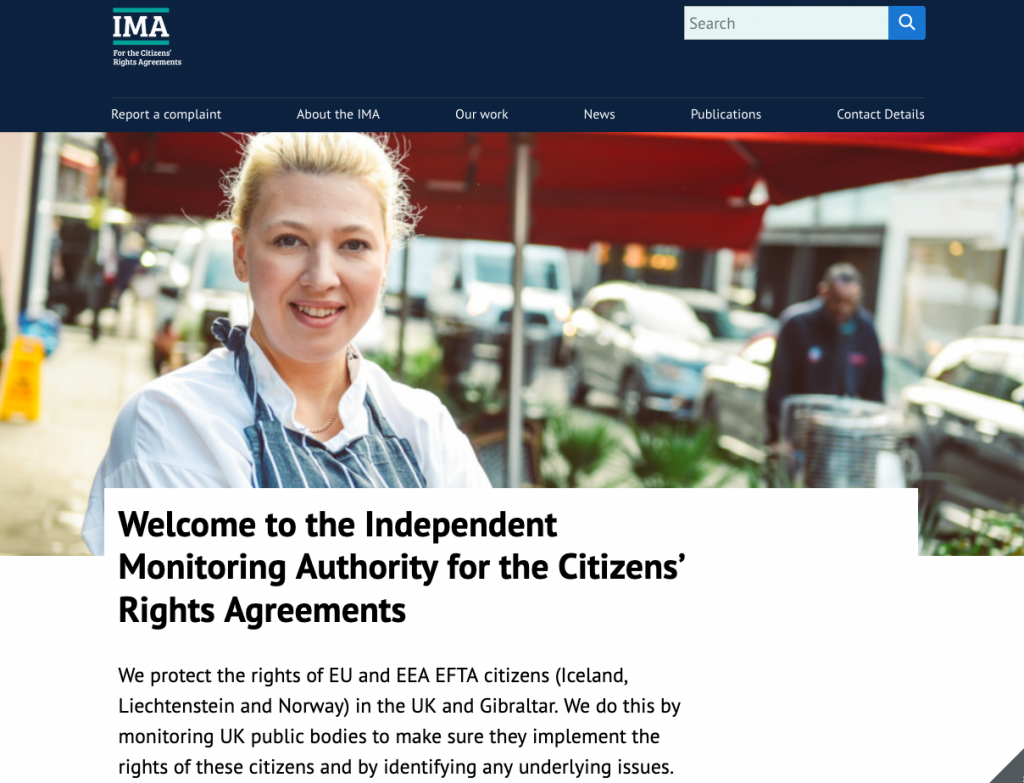Citizens’ Rights and the EU Settlement Scheme – 3 Years On (Event Review)
On 29th March 2021, the Institute for the Study of European Laws (ISEL) at The City Law School hosted a webinar of experts speaking about the experiences of EU citizens in the UK, and British citizens in the EU, since the UK voted to withdraw.
The first to speak was Dr Michaela Benson, Reader in Sociology at Goldsmiths University of London and co-investigator in the ESRC-funded project on ‘Rebordering Britain and Britons after Brexit’, aiming to understand the flows of migration between the UK and EU and how this has changed since the referendum. The project highlights vulnerabilities felt by British and EU citizens even before any change in legal rights was implemented. Benson spoke on the experience of the 1.2 million British citizens living in the EU27, a group somewhat overlooked throughout the Brexit process. The idea that they were a ‘forgotten group’ is manifested in Case C-275/92 Schindler where it was established that UK citizens living abroad for more than 15 years could not vote in the referendum. Alongside this group of citizens, Benson pointed to the disproportionate effect that Brexit has had on EU families and Eurochildren and the frustration and anxiety this has caused among them. She went on to question the potential effects that factors such as class, ethnicity, age, life stage and gender will have on the individuals and how they are impacted by Brexit. This may include their ability to exercise their rights under the relevant immigration schemes, or even their choice to migrate.
The project aims to produce new and timely knowledge on the long-term changes on migration flows into and out of the UK, while also intervening in public and political understandings of Britain’s migration story and future. This will be assessed by considering the position of ‘settled populations’ and whether they will reassess their residential futures due to the changing legal status, political crises and also now, the pandemic. Whether the transformations to migration governance regimes interfere with the decisions to migrate and repatriate will also be a question that Benson, Professor Nando Sigona (University of Birmingham) and their team are looking to answer.
Following on from this was Rhys Davies, General Counsel at the Independent Monitoring Authority for the Citizens Rights’ Agreements (IMA), who spoke about the new authority’s functions. The IMA is provided for in the Withdrawal Agreement (WA) to ensure the implementation of citizens’ rights protection; this authority will have powers equivalent to the EU Commission. Davies talked about the main functions of the IMA and how this will act to enforce the rights provided for citizens by the UK and EU. Sitting independently from the government but sponsored by them, the authority will assess the strategic direction in regard the implementation of the WA. Davies mentioned the geographic nature of the body, and highlights that members come from Scotland, NI, Wales and even Gibraltar. The importance of the authority is seen in their ability to receive complaints from individuals who believe their rights have been infringed.
Looking at the procedural structure, Davies spoke about the three routes available to the authority to make inquiries. The first is via complaints where they highlight general, systemic failings in lack of protection. A further avenue for inquiry is through the IMA’s initiative powers, off the back of collation of data from a variety of sources. The final route is through requests from the governments across the UK. How these inquiries develop will determine the outcome, however, generally a report will be completed alongside various recommendations for the relevant public authorities concerned, in areas where there could be improvements. Davies emphasised the importance of the body in not only picking out the bad practice but promoting and sharing knowledge of where things are going well. Although the services of the IMA have only been active since the end of 2020, Davies underlines the focus they have placed upon promoting awareness of their role and encouraging those who are affected to come forward.
Next to present were Professor Charlotte O’Brien and Dr Alice Welsh, representing the EU Rights and Brexit Hub, another ESRC-funded project at York Law School, University of York. The hub is a legal action research project focusing on EU nationals who fall within the scope of the WA and under the EUSS. O’Brien and Welsh highlighted the hurdles that citizens are currently facing. The findings so far suggest that the existing problems are not only continuing, but getting worse due to confusion of overlapping rights, which O’Brien contended will lead to cutting of rights. One of the main concerns surrounding the EUSS is the deadline given to citizens to apply (30th June 2021). As O’Brien pointed out, people miss deadlines! However, when compared with the irreversible loss of rights that would arise out of a mere administrative failure, there appears to be an issue of disproportionality. This issue was illustrated by pointing to the oxymoron of ‘permanent residence’ not really translating to permanence, as now these individuals must apply for the new settled status. This is bound to lead to missed applications and potentially grave consequences.
Furthermore, the confusing nature of the two different statuses (pre-settled and settled) created a complicated timeline and a vast number of ‘cliff edges’ for citizens. This would not allow for one single government campaign to ensure citizens come forward in a number of years’ time to assure their rights are protected. Welsh proposed an alternative streamlined and assisted transition from the temporary, pre-settled status to the permanent, settled status. This would include the sending of a link to all those who need to reapply; allowing them to make a declaratory statement that they meet the requirements, alongside two references. Alongside these already apparent flaws within the scheme, both showed concern for the lack of information on how accurate the decisions are. Accuracy is vital when considering the restrictions under pre-settled status (this can be seen in regard to benefits) and the necessity for the individual to apply again for settled status, and risk losing rights all together throughout the application process. The project has clearly already done a lot of work to highlight the problems as of current times, however it is certain that as more data comes through concerning applications made and whether they are successful, they will be able to assert much more on the future migration situation.
The final key speaker was Andy Sirel, Legal Director and Partner at human rights charity JustRight Scotland. Sirel’s work focuses primarily on EU and European Economic Area (EEA) children in care and the potential problems they may face in securing rights under the EUSS. One of the most worrying issues Sirel has found is the lack of knowledge that the local authority has on the actual numbers of children there are who can apply to the EUSS and where they are. Often the problems in this area arise out of the lack of understanding that local authorities, and their employees, have of immigration law. The ‘at-risk group’ include EEA citizen children, non-EEA children of EEA citizens, non-EEA children of non-EEA citizens (who are family members of EEA citizens). There is a massive underestimation of where these children are, and currently less than half have actually made an application to the EUSS.
Sirel insisted it is ‘inevitable’ that children will fall through the net. This problem is also a result of the current immigration status system. Accompanied children are dependent on others (parents or customary carers) for their status. Thus, when the primary status holder beaches these terms, or the child is taken into care they essentially become undocumented. Also, non-EEA family members may not, for the same reason, possess adequate proof that the EEA national exercised treaty rights. Despite seemingly being unable to fulfil the requirements of EUSS, Sirel insists that many do, and the local authorities have an obligation to ensure the correct rights are conferred upon them. Looking at the breadth of potential scenarios in which children may face issues, Sirel covers the type of evidence needed, the issue of ‘no recourse to public funds’, uncooperative parents and the issues this raises in regard to parental responsibility. Despite the overwhelming nature of these deficiencies in the current scheme, Sirel maintains there are solutions.
The event, marking the date that Britain should have left the EU three years ago, demonstrates the uphill battle we now face in protecting citizens. These projects, however, show the wealth of knowledge and determination there is to ensure that these complex issues are not left unheard.
For more information on each of the speakers’ contributions please see:
Independent Monitoring Authority for the Citizens’ Rights Agreements (IMA)
Many thanks to Katie Henderson for this review. Katie is a second year LLB Law student at The City Law School, working as a legal assistant at the Pro Bono clinic for the charity Dads House. Her interests lie within EU law, constitutional law and politics and she is a co-founder of the Women in Law society at City.




